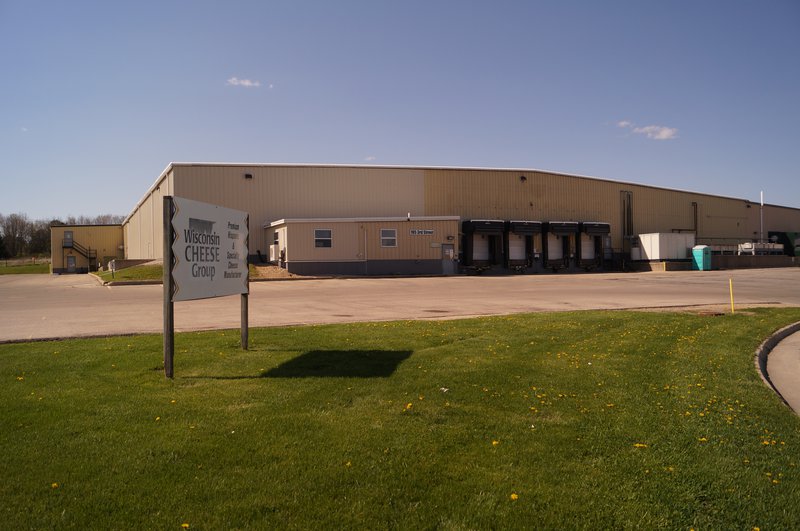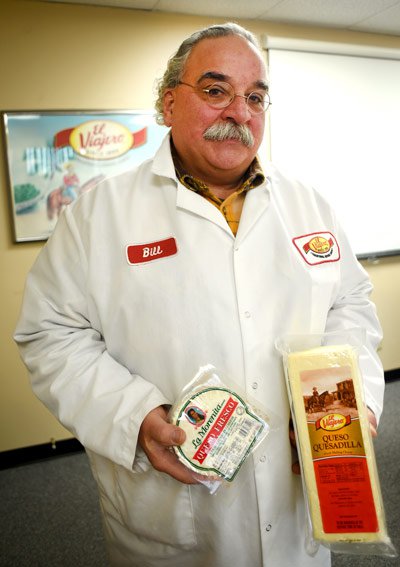This story was originally published May 3 and updated on May 4.
MONROE — Six employees at Wisconsin Cheese Group's packaging facility have tested positive for COVID-19 as of May 4 and the company is working with county health officials to test all employees at the location and follow safety protocols.
Plans are in place to test up to 147 people on-site this week at the packaging plant at 105 3rd St., said Green County Public Health Director RoAnn Warden.
The company announced the outbreak on the evening of May 2. Warden provided more details in emails to the Times.
The first reported case at Wisconsin Cheese Group is a Stephenson County resident who took the test April 22, with a positive result returned two days later. The second positive case was reported April 28, with more positive test results returned in the following days.
"The cases are considered connected due to the fact that they work at the same facility," Warden said.
The five employees who are Green County residents who tested positive are at home in isolation, she said. The five are counted in the 16 confirmed COVID-19 cases reported so far in Green County since March 20. Cases are tracked by county of residence. Stephenson County had 63 confirmed cases as of May 3.
Close to 200 employees work at the packaging plant at 105 3rd St., said plant manager Travis Stauffacher. The plant operates with one shift per day. The cheese is made at the company's other locations, 1722 12th St. in Monroe and 115 Coates Ave. in Monticello, and overall the company employs about 275 across the three locations, he said.

The safety measures include daily temperature checks upon entry into the plant, screening for COVID-19 symptoms among employees, mandated use of face masks and face shields, frequent and thorough sanitization procedures, reconfigured break areas and restrictions on all visitors and business travel.
Warden confirmed that Wisconsin Cheese Group has implemented the safety protocols. She said Green County Public Health "conducted a facility walk-through assessment (on May 1) and made additional infection-control recommendations."
Fransen said any employee with COVID-19 symptoms or who tests positive for COVID-19 "is immediately quarantined" and the company is following the guidance of health officials to determine employee wellbeing and return-to-work policies. No shutdown is planned, he said.
'Rather be safe than sorry'
Sue Minkie, a 60-year-old Monroe resident, is a Wisconsin Cheese Group line worker at the packaging facility. She said she was quarantined as a precaution for two weeks starting April 24 because she worked on the same line as the first person who tested positive.
"Our whole line got quarantined," she said. She has not been sick or had symptoms of COVID-19. She left work early on April 24 to celebrate her 38th anniversary with her husband and got the call informing her of her quarantine about an hour later.
She was "shocked" because she didn't think the coworker on her line who left work due to illness two days earlier "had a lot of symptoms."
She said she's grateful for the quarantine as a safety precaution. She's being paid her full-time wages through a provision in the federal Coronavirus Aid, Relief and Economic Security (CARES) Act.
"I'm thanking the Lord that they quarantined us. I'd rather be safe than sorry," she said. "It's not only me I have to worry about. My husband works at Emmi Roth, so ... if I get sick, he has to stay home as well."
In the past two weeks she said she's only left the house twice, both times to pick up prescriptions at a pharmacy. Otherwise she's kept busy cleaning: "I think my house is spotless now. What else am I going to do?"
She said a Wisconsin Cheese Group human resources manager has regularly checked in with her during the quarantine and a public health nurse calls daily to check for symptoms like cough and fever. She praised the local health department for being "very helpful" and "very, very clear" when answering her questions.
Wisconsin Cheese Group added a second break room for line workers and plexiglass barriers on the break room tables over a month ago to allow for easier physical distancing between employees, Minkie said.
"The masks we started wearing on April 22," she said. Line workers at the packaging facility typically work two to three feet apart, less than the recommended six feet for social distancing, but "it's not like a meatpacking factory," she said.
Cheese facilities less at risk
COVID-19 outbreaks have shut down meatpacking plants nationwide in recent weeks, including in Wisconsin, but cheese plants appear to be far less affected.
Dairy plants are unlikely to house large COVID-19 outbreaks, according to an April 24 Farm Journal article. Andy Novakovic, a dairy economist at Cornell University, told the publication that unlike meatpacking plants, dairy processing facilities are highly automated and employees are not working shoulder to shoulder.
More employees do work closer together in conversion plants like Wisconsin Cheese Group's 105 3rd St. facility, where large blocks of cheese are cut and packaged into retail-sized portions, "but the numbers are nothing compared to an average meat plant," according to Farm Journal.

Another factor that mitigates the likelihood of a viral outbreak are the cleanliness and food safety standards cheese plants already follow, like changing clothes on-site, washing hands and disinfecting boots. Such practices are necessary when dealing with a highly perishable product like milk.
Wisconsin Cheese Group produces mostly Hispanic-style cheeses like queso blanco and queso fresco, which Director of Manufacturing Jim Crubaugh said is "basically like fresh milk with a little salt" and "a notoriously hazardous product to make" from a food-safety standpoint.
"We spend way more on testing than a cheddar maker," Crubaugh said in an interview last year. "We just test, test, test. We're constantly swabbing the plant."
Nevertheless, COVID-19 has cropped up at a handful of cheese production facilities nationwide.
A cheese plant in Fort Morgan, Colorado, a city of about Monroe's size 90 miles northeast of Denver, shut down in late April after 80 employees, about 20% of the workforce, tested positive for COVID-19, according to the Denver Post. Leprino Foods planned to reopen in five days with limited operation after all employees were tested.
Three Saputo cheese plants in California were "thoroughly cleaned and disinfected" after a contract employee who had contact with the facilities in mid-March tested positive for COVID-19, the Visalia Times Delta reported.




